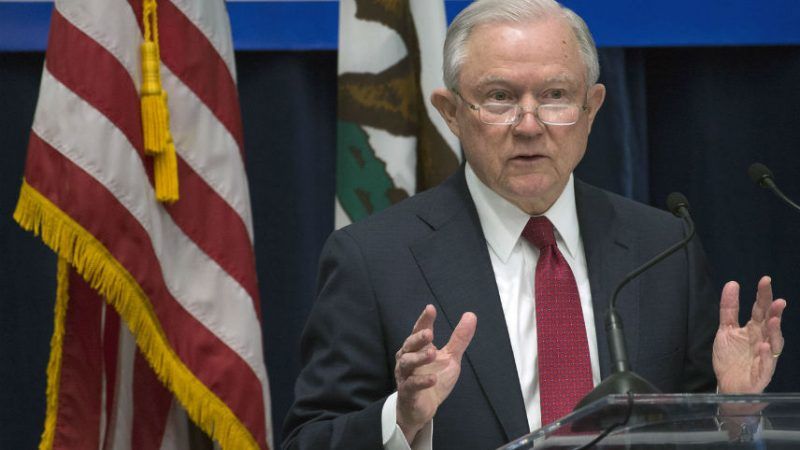Jeff Sessions' Immigration Lies
An ICE spokesman resigning because he "didn't feel like fabricating the truth" should be a wake-up call about the White House's factually untethered approach to immigration policy.

Last week in Sacramento, U.S. Atty. Gen. Jeff Sessions said that because Oakland Mayor Libby Schaaf gave a public warning before a recent immigration sweep, agents from Immigrations and Customs Enforcement "failed to make 800 arrests that they would have made if the mayor had not acted as she did."
This was, like so many things Sessions and his boss, President Trump, say about immigration, a lie. From sanctuary cities to voter fraud to the visa lottery system, this administration is not only bending the truth about the foreigners in our midst, but also actively basing policy on its fever dreams.
The ICE raid in question targeted around 1,000 people, leading to 232 arrests. According to reporting by The New York Times, such large-scale enforcement actions typically have a success ratio of around 30%. If that's true, the arrest deviation from the norm was about 70, not Sessions' 800.
What's more, the blanket characterization of the non-caught as "criminal aliens and public safety threats" (in the words of acting ICE director Thomas Homan) isn't accurate, either. Only half of those arrested had convictions for "serious or violent" crimes or "significant or multiple" misdemeanors, consistent with stats from previous raids. It's almost as if the people in charge of enforcing our laws are trying to scare us into giving them more power.
In a rare and clarifying moment of bureaucratic honesty, ICE San Francisco spokesman James Schwab resigned rather than go full boogeyman.
"I didn't feel like fabricating the truth to defend ourselves against [Schaaf's] actions was the way to go about it," Schwab told the San Francisco Chronicle. "We were never going to pick up that many people. To say that 100% are dangerous criminals on the street, or that those people weren't picked up because of the misguided actions of the mayor, is just wrong."
Immigration hardliners may be asking themselves: What's the problem with a little hyperbole, especially given that politicians and government officials (including many in California) routinely dissemble and lie?
It's a good question, with an easy answer.
Any government propaganda is worth calling out, whether it's Barack Obama's "noble lie" about people being able to keep their doctors and insurance policies, or the fibs most of California's political class have told themselves over the years about the affordability of that $77.3 billion (and counting) bullet train scheduled for completion any decade now.
But what's weird about America in 2018 is that the political fables we tell about our opponents are now becoming the basis of real-world government action, frequently misguided. This is particularly true in the divisive, difficult and emotional area of immigration policy. Consider:
* Days after taking the oath of office, Trump made the factually ludicrous claim that 3 million to 5 million people voted illegally for Hillary Clinton in 2016. This led directly to the creation of the Presidential Advisory Commission on Election Integrity, a debacle that was thankfully disbanded before it could do real harm. The voter-fraud conspiracy theorists associated with the commission, though, are now concentrating their energies on making sure the 2020 census undercounts immigrants in the country illegally by asking all recipients about their legal status for the first time since 1950. (Undercounting would lead to less political power in the House of Representatives in blue states such as California with large undocumented populations.)
* Trump has for months been campaigning to end the "diversity visa lottery," making it a condition of getting a final deal on so-called Dreamers. His description of the visa, which is granted to 50,000 people a year from low-migration countries, bears almost no resemblance to reality.
"Do you think the country is giving us their best people? No. What kind of a system is that?" he told FBI graduates in December. "They come in by lottery. They give us their worst people, they put them in a bin, but in his hand, when he's picking them is, really, the worst of the worst. Congratulations, you're going to the United States."
Actually, home-country governments don't pick their exiting populations, and the recipients have to meet education requirements and other qualifications imposed by Washington.
* Trump wants to end what he and Sessions call chain migration (family migration is the more value-neutral term), arguing in his State of the Union address that, "under the current broken system, a single immigrant can bring in virtually unlimited numbers of distant relatives." This description, too, is untrue: Immigrants can only bring in members of their nuclear family, through a process that is in practice quite arduous.
We expect, though should never accept, that political actors will fudge facts and straight-out make things up to persuade people and gain votes. But Trump and Sessions are more than just politicians — they are the head of the executive branch and the No. 1 law enforcement official in America, respectively, and they're weaving policy from fantasy.
This article originally appeared in the Los Angeles Times.


Show Comments (46)